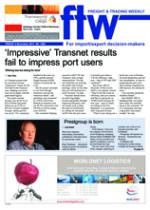As Transnet posted what
its executives termed
“impressive” results for the
first half of the financial
year, shipping executives
were not so happy with the
gold-tinted figures.
The report showed
revenue was up 20.3% to
R22.4 billion and profit
before tax up 27.4% to
R9.4 bn. Overall weighted
average volume growth
was up by 7.1%, containers
handled at the ports up
9.9%, and the general
freight business (GFB)
volumes in particular up
6.3%.
But the group’s attempts
to cut costs through
numerous cost-saving
initiatives failed – and
operating costs increased
by 15.9% to R13.0 bn,
blamed on material costs
(up 26.5%), personnel costs
(14.4%) as well as energy
costs (26.0%).
One unnamed shipping
executive told FTW that
Transnet’s lack of logic
surprised him. “On the
one hand they are praising
the profits and revenue
earnings, while on the other
they are still looking for a
tariff increase,” he said.
“Transnet should focus
on achieving higher
income and profits through
improved efficiency, and
not simply look to plug
the holes of inefficiency
by calling for increased
tariffs from the port users.
I certainly give them a
2/10 for efficiency right
now – that is TPT and TFR
combined.”
Ron Frick, MD of
Deutsche Afrika Linien
(DAL), was equally critical.
“They’re not the result of
efficiency and cost control,
and they’re asking for an
18.06% tariff increase for
next year – part of which,
according to the Port
Regulator, is to guarantee
their expected revenue.
“They’re also taking out a
berth next year in Durban,
for berth deepening and rail
line installations, so they’re
penalising the port users
and trucking companies by
offering less, but asking for
more.
“Any increase should be
inflation-linked.”
Sam Moffitt, MD of
Hamburg Süd, was much
more brief, but similarly
sharp in his comment. “If
it’s a parastatal showing
a big profit, that means
trouble,” he said.
‘Impressive’ Transnet results fail to impress port users
04 Nov 2011 - by Alan Peat
0 Comments
Border Beat
Featured Jobs
New
New

